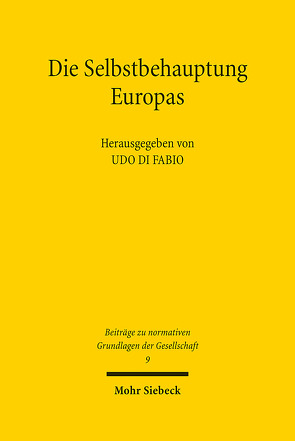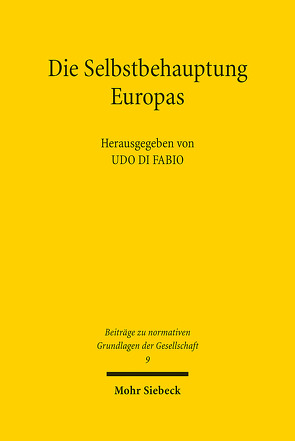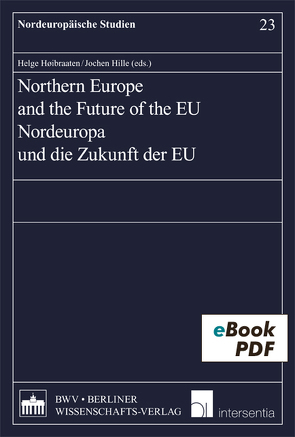
The current relationship between the Nordic countries and the European Union appears complex and confusing. Although Denmark, in 1973, and Sweden and Finland, in 1995, joined the European Union, the entry of Norway into the Union was rejected in the plebiscites of 1972 and 1994. Furthermore, Nordic EU members enjoy permanent exceptions to their integration into the EU: Denmark and Sweden, like the U.K., have declined to become part of the monetary union. Finland is essentially the only Nordic country that entered the EU without substantial exceptions. A membership bid from Iceland was unthinkable; after the fi nancial crisis – which is not the topic of this book – Iceland applied for membership in 2010 and has been in discussions with the European Commission ever since. In other words: the European Union divides Nordic societies, which has resulted in a series of national exceptions to the integration process. Taken together, these exceptions have created an integration process whose overall geometry is contradictory and paradoxical. Considering this melange, this book will discuss the actual state of Nordic integration into the EU from many different perspectives and illuminate future developments in the fi eld of integration. Where is the North relative to Europe today? How can the geometry of Northern Europe’s integration, developed over a long time, be characterised? What are the challenges that threaten further development of Nordic-European relationships?
Aktualisiert: 2023-06-15
> findR *
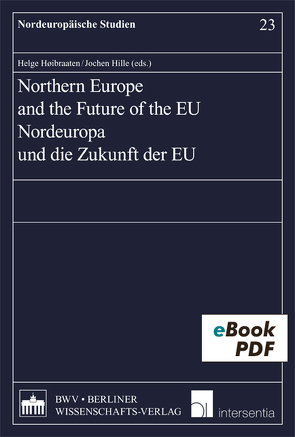
The current relationship between the Nordic countries and the European Union appears complex and confusing. Although Denmark, in 1973, and Sweden and Finland, in 1995, joined the European Union, the entry of Norway into the Union was rejected in the plebiscites of 1972 and 1994. Furthermore, Nordic EU members enjoy permanent exceptions to their integration into the EU: Denmark and Sweden, like the U.K., have declined to become part of the monetary union. Finland is essentially the only Nordic country that entered the EU without substantial exceptions. A membership bid from Iceland was unthinkable; after the fi nancial crisis – which is not the topic of this book – Iceland applied for membership in 2010 and has been in discussions with the European Commission ever since. In other words: the European Union divides Nordic societies, which has resulted in a series of national exceptions to the integration process. Taken together, these exceptions have created an integration process whose overall geometry is contradictory and paradoxical. Considering this melange, this book will discuss the actual state of Nordic integration into the EU from many different perspectives and illuminate future developments in the fi eld of integration. Where is the North relative to Europe today? How can the geometry of Northern Europe’s integration, developed over a long time, be characterised? What are the challenges that threaten further development of Nordic-European relationships?
Aktualisiert: 2023-06-07
> findR *
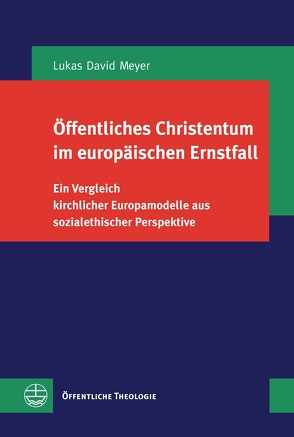
Die Studie untersucht die Rolle der Kirchen in der jüngeren Phase der europäischen Einigung. Den Ausgangspunkt bilden die Verfassungs-, Finanz- und Migrationskrisen im 21. Jahrhundert. Unter dem Eindruck dieser Krisen brachten die Kirchen ihre Haltung zu Europa deutlicher als zuvor zum Ausdruck. In neun Fallstudien werden Katholizismus, Protestantismus und Orthodoxie im kontextuellen Verhältnis zur EU untersucht. Die Studie plädiert für eine europäisierte Variante eines öffentlichen Christentums. Leitbegriffe dafür bietet der konziliare Prozess mit der geprägten Begriffstrias »Frieden, Gerechtigkeit und Bewahrung der Schöpfung«. Sie markieren die Relevanz eines öffentlichen Christentums für das gegenwärtige Europa.
[Public Christianity in European Crises. A comparison of churches in contemporary Europe from an ethical perspective]
This study examines the role of churches in the recent phase of European unification. The starting point are the constitutional, financial and migration crises of the 21st century. Churches were challenged to express their stance on Europe in these crises. In nine case studies, Catholicism, Protestantism and Orthodoxy are examined in their contextual relationship to the EU. The study argues for a Europeanized approach to Public Christianity. The guiding principles of the conciliar process – peace, justice and integrity of creation – are central here. They mark the importance of Public Christianity for contemporary Europe.
Aktualisiert: 2023-04-25
> findR *
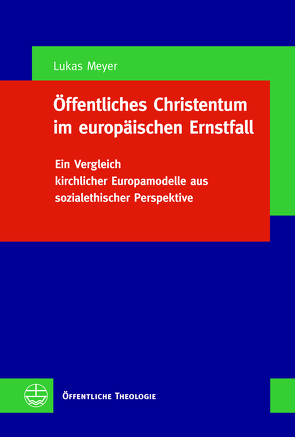
Die Studie untersucht die Rolle der Kirchen in der jüngeren Phase der europäischen Einigung. Den Ausgangspunkt bilden die Verfassungs-, Finanz- und Migrationskrisen im 21. Jahrhundert. Unter dem Eindruck dieser Krisen brachten die Kirchen ihre Haltung zu Europa deutlicher als zuvor zum Ausdruck. In neun Fallstudien werden Katholizismus, Protestantismus und Orthodoxie im kontextuellen Verhältnis zur EU untersucht. Die Studie plädiert für eine europäisierte Variante eines öffentlichen Christentums. Leitbegriffe dafür bietet der konziliare Prozess mit der geprägten Begriffstrias »Frieden, Gerechtigkeit und Bewahrung der Schöpfung«. Sie markieren die Relevanz eines öffentlichen Christentums für das gegenwärtige Europa.
[Public Christianity in European Crises. A comparison of churches in contemporary Europe from an ethical perspective]
This study examines the role of churches in the recent phase of European unification. The starting point are the constitutional, financial and migration crises of the 21st century. Churches were challenged to express their stance on Europe in these crises. In nine case studies, Catholicism, Protestantism and Orthodoxy are examined in their contextual relationship to the EU. The study argues for a Europeanized approach to Public Christianity. The guiding principles of the conciliar process – peace, justice and integrity of creation – are central here. They mark the importance of Public Christianity for contemporary Europe.
Aktualisiert: 2023-04-25
> findR *
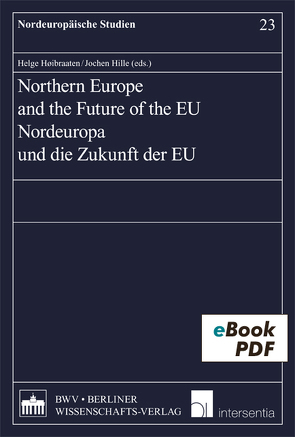
The current relationship between the Nordic countries and the European Union appears complex and confusing. Although Denmark, in 1973, and Sweden and Finland, in 1995, joined the European Union, the entry of Norway into the Union was rejected in the plebiscites of 1972 and 1994. Furthermore, Nordic EU members enjoy permanent exceptions to their integration into the EU: Denmark and Sweden, like the U.K., have declined to become part of the monetary union. Finland is essentially the only Nordic country that entered the EU without substantial exceptions. A membership bid from Iceland was unthinkable; after the fi nancial crisis – which is not the topic of this book – Iceland applied for membership in 2010 and has been in discussions with the European Commission ever since. In other words: the European Union divides Nordic societies, which has resulted in a series of national exceptions to the integration process. Taken together, these exceptions have created an integration process whose overall geometry is contradictory and paradoxical. Considering this melange, this book will discuss the actual state of Nordic integration into the EU from many different perspectives and illuminate future developments in the fi eld of integration. Where is the North relative to Europe today? How can the geometry of Northern Europe’s integration, developed over a long time, be characterised? What are the challenges that threaten further development of Nordic-European relationships?
Aktualisiert: 2023-03-21
> findR *
Ein verändertes geopolitisches Umfeld zwingt die Europäische Union zu einer Neuorientierung sowohl ihrer Föderalität im Inneren als auch ihrer Handlungsfähigkeit nach außen. Wie kann sie ihre politische und ökonomische Potenz entfalten, um ihrer selbst proklamierten globalen Verantwortung in einer veränderten Welt gerecht zu werden? Im sich verschärfenden Handels- und Systemkonflikt zwischen den USA und China und angesichts der Konflikte an ihrer Peripherie muss die Europäische Union ihre normative Idee in einer veränderten Welt finden und behaupten. Vor diesem Hintergrund fand 2019 ein Werkstattgespräch im Bonner Forschungskolleg normative Gesellschaftsgrundlagen (FnG) statt. Die dort gehaltenen Vorträge sind in diesem Sammelband zusammengefasst und durch einen Beitrag des Herausgebers zur europäischen Verfassungskrise nach dem PSPP-Urteil des Bundesverfassungsgerichts vom 5. Mai 2020 ergänzt.
Aktualisiert: 2022-12-15
> findR *
Ein verändertes geopolitisches Umfeld zwingt die Europäische Union zu einer Neuorientierung sowohl ihrer Föderalität im Inneren als auch ihrer Handlungsfähigkeit nach außen. Wie kann sie ihre politische und ökonomische Potenz entfalten, um ihrer selbst proklamierten globalen Verantwortung in einer veränderten Welt gerecht zu werden? Im sich verschärfenden Handels- und Systemkonflikt zwischen den USA und China und angesichts der Konflikte an ihrer Peripherie muss die Europäische Union ihre normative Idee in einer veränderten Welt finden und behaupten. Vor diesem Hintergrund fand 2019 ein Werkstattgespräch im Bonner Forschungskolleg normative Gesellschaftsgrundlagen (FnG) statt. Die dort gehaltenen Vorträge sind in diesem Sammelband zusammengefasst und durch einen Beitrag des Herausgebers zur europäischen Verfassungskrise nach dem PSPP-Urteil des Bundesverfassungsgerichts vom 5. Mai 2020 ergänzt.
Aktualisiert: 2022-07-25
> findR *
MEHR ANZEIGEN
Bücher zum Thema Europäische Verfassungskrise
Sie suchen ein Buch über Europäische Verfassungskrise? Bei Buch findr finden Sie eine große Auswahl Bücher zum
Thema Europäische Verfassungskrise. Entdecken Sie neue Bücher oder Klassiker für Sie selbst oder zum Verschenken. Buch findr
hat zahlreiche Bücher zum Thema Europäische Verfassungskrise im Sortiment. Nehmen Sie sich Zeit zum Stöbern und finden Sie das
passende Buch für Ihr Lesevergnügen. Stöbern Sie durch unser Angebot und finden Sie aus unserer großen Auswahl das
Buch, das Ihnen zusagt. Bei Buch findr finden Sie Romane, Ratgeber, wissenschaftliche und populärwissenschaftliche
Bücher uvm. Bestellen Sie Ihr Buch zum Thema Europäische Verfassungskrise einfach online und lassen Sie es sich bequem nach
Hause schicken. Wir wünschen Ihnen schöne und entspannte Lesemomente mit Ihrem Buch.
Europäische Verfassungskrise - Große Auswahl Bücher bei Buch findr
Bei uns finden Sie Bücher beliebter Autoren, Neuerscheinungen, Bestseller genauso wie alte Schätze. Bücher zum
Thema Europäische Verfassungskrise, die Ihre Fantasie anregen und Bücher, die Sie weiterbilden und Ihnen wissenschaftliche
Fakten vermitteln. Ganz nach Ihrem Geschmack ist das passende Buch für Sie dabei. Finden Sie eine große Auswahl
Bücher verschiedenster Genres, Verlage, Autoren bei Buchfindr:
Sie haben viele Möglichkeiten bei Buch findr die passenden Bücher für Ihr Lesevergnügen zu entdecken. Nutzen Sie
unsere Suchfunktionen, um zu stöbern und für Sie interessante Bücher in den unterschiedlichen Genres und Kategorien
zu finden. Unter Europäische Verfassungskrise und weitere Themen und Kategorien finden Sie schnell und einfach eine Auflistung
thematisch passender Bücher. Probieren Sie es aus, legen Sie jetzt los! Ihrem Lesevergnügen steht nichts im Wege.
Nutzen Sie die Vorteile Ihre Bücher online zu kaufen und bekommen Sie die bestellten Bücher schnell und bequem
zugestellt. Nehmen Sie sich die Zeit, online die Bücher Ihrer Wahl anzulesen, Buchempfehlungen und Rezensionen zu
studieren, Informationen zu Autoren zu lesen. Viel Spaß beim Lesen wünscht Ihnen das Team von Buchfindr.





